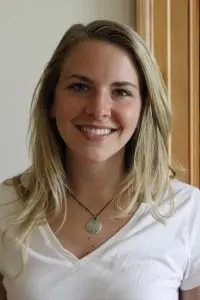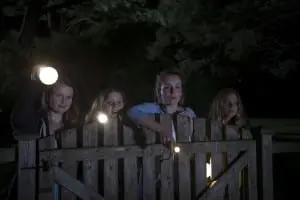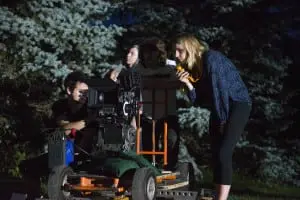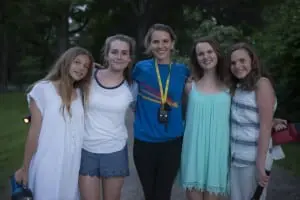Erstwhile, though fictional, offers a glimpse of four girls growing up in Garrison, as the director and her three sisters did
By Alison Rooney
There were once four sisters who grew up near the Hudson River in Garrison, sharing adventures. Separated by diverse personality traits but bonded in familial unity, these girls have now reached adulthood, and one of them, the second eldest, a budding film director, has reinvented them — her version of them — in her directorial debut, a short film, entitled Erstwhile.

Filming, which took place solely in Garrison, with a cast of three local girls and one non-local adult actress, was recently completed after a couple of all-night-long shooting marathons, all guided by the young woman behind the camera, Beatrice Copeland.
Copeland’s path toward directing began immediately after her graduation from Elon University a mere three years ago. After deciding against her original leaning toward journalism “because it didn’t feed my creative desire for starting something from the ground up,” Copeland, now 25, moved to Los Angeles and spent two and a half years there, working first at a talent agency, where she “really got to see the big players in Hollywood and how movies are made.”
Cultivating the craft
She then moved on to an award-winning production company called Tool of North America — a place Copeland calls “incredibly innovative … I was lucky to spend time both on- and off-set,” and it was there she determined she was “pretty positive I wanted to become a director. I compiled a list of the top 500 or so directors working in the world and there were maybe 20 females, which is just crazy. Filmmaking is so far behind modern industry in this way and it’s a problem. Women are good at cultivating this craft and at seeing things from beginning to end. Looking at that list was a punch to the gut. From then on I was intent on absorbing everything I could in the industry, gaining a firm foundation in what it is.”
Last fall, Copeland got an opportunity to work on her first studio feature film when she was hired as a production assistant on the re-make of Annie. Returning to New York in September, she earned her keep: “We were working 14-hour days, every day, for 59 days. In the cold and the snow all around New York City, we finally wrapped at the end of December.”

Having also served as an assistant to the producers on an independent film called Short Term 12, which went on to win awards at the South By Southwest Film Festival, Copeland sampled the contrasting tastes of big-budget filmmaking and its opposite.
“The independent film experience was about a director’s vision coming to life,” she said. “It was a small crew, scrapping together … Between the two experiences, I got to see the films I could be making. Being called green in Hollywood can place you into either of two roles — you can embody being ‘an assistant’ and think of it as a learning journey or you can just be there to be called upon. You can use the experience as a stepping stone and an educational opportunity. You can thrive on the experience and the incredible access that it gives.”
Directorial debut
When the Annie marathon ended, Copeland decided to stay in New York and devote herself to her goal, writing and directing her own film. “A lot of people talk about making movies; the risks are high, the rewards low, and I just decided it was time. I needed to make my own short film to jumpstart my directing career, I needed to make my own content, from the bottom up.”
With skills in shooting and editing video Copeland was able to take on side jobs to earn some money while she took the time to write her script. Copeland has always had numerous ideas floating through her head.
“Of the list of about 30, one which was always on there was a remake of Little Women,” she notes. “That story paralleled my own experience, growing up. It was a very loud household, very dynamic, spontaneous — all things a film could be made of. So many people say ‘write what you know — start from your home base.’ It’s a perfect way of paying tribute to where you come from and dive into a creativity bucket. In my Garrison childhood I spent so much time outside. We were always riding bikes, going down to the river.

“That meshed with the unique experience of growing up with three women who are so different. My oldest sister recently got engaged. With this I wanted to tell the story of my childhood and capture a moment. Even though there are fictional sentiments, the ambiance speaks to the world my sisters and I grew up in, which is now right on the brink of my sister leaving this bond that had been the four of us. This film is something I wanted all of us to have. To cast girls who grew up here was also special.”
Those girls, Marina Martin, Emerson Smith and Freya Wood-Gallagher, were found via word-of-mouth auditions and recommendations. “It’s so special to have locals be a part of it,” Copeland says. “I got lucky with all of them [the fourth member of the cast is Kate Flanagan]. They totally embody it, and on top of that were happy to jump into a freezing cold pool at 2 a.m.! We shot at my house and my neighbor’s house — we turned it into a film compound for a week.”
Being the one everyone turned to once shooting began didn’t phase Copeland at all, something she was almost surprised by. “I stopped and thought ‘This feels good; I don’t feel anxious or rushed.’ Three years after graduating college to be confident, be in control, be proud of the sweat and tears put into assistant jobs, paying dues — this is a culmination of all my experiences,” Copeland said.

Erstwhile is now in post-production mode. Copeland believes it will turn out to be around six minutes long. “This is just a piece of the story,” she says. Even with the lowest of budgets and no frills, any film involves the incurring of costs. Traveling on a by-now common route, Copeland initiated a Kickstarter campaign to help defray those costs. At the time of this writing the campaign had generated about $1,500 in excess of the goal of $4,500.
This funding will be applied to things like music, artwork, and the creation of promotional materials, with a frenzy of activity taking place now through early August, when Copeland hopes to have the finished project ready. Once that happens, she will immediately start sending it off to festivals for consideration. “You send it out in the world and hope for interest,” she said. And after that, in terms of directing, Copeland’s off again: “Once we ‘picture lock’ Erstwhile I’ll be thinking of the next one. It’s been so fulfilling so I’m ready to suit up for the next one.”
Set photos by Blake D’Onofrio

